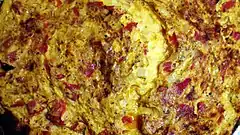Egg substitutes
Egg substitutes are food products which can be used to replace eggs in cooking and baking.

Close-up view of an omelette prepared with an egg substitute
Types
Commercial
There are many commercial substitutes on the market today for people who wish to avoid eggs. Most of these products are devoid of all animal products, and thus are vegan and contain no cholesterol.
- JUST, Inc., a venture-backed company, produces and markets egg-free products, including cookie dough and a mayonnaise substitute, based on pea protein from the yellow pea.[1][2][3]
- Egg Replacer[4] is a mixture of "potato starch, tapioca flour, leavening (calcium lactate, calcium carbonate, cream of tartar), cellulose gum, modified cellulose".[5]
- The Vegg is a vegan liquid egg yolk replacer, suitable in any recipe that one would alternatively use egg yolk. It is made of "nutritional yeast flakes, sodium alginate, kala namak, [and] beta-carotene".[6] The Vegg was first sold in 2012, and is available in a variety of online and in-store retailers in the United States, Europe, United Kingdom, Australia, New Zealand, and South Africa.
- FUMI Ingredients produces egg white substitutes[7] from micro-algae with the help of micro-organisms such as brewer's yeast and baker's yeast.[8][9][10]
Homemade
Simple homemade egg substitutes can be made using tofu, a variety of fruits, potato starch, mashed potato, baking powder, ground seeds, agar powder,[11] chickpea flour,[12] and more.
- Aquafaba is an all-natural egg replacer discovered by specialists in molecular gastronomy. It can be obtained from plain chickpea cooking brine (or from several other legumes). It enables egg-avoiding cooks to replicate such elusive egg dishes as macarons or lemon meringue pie.

Tofu may be used for creating egg-like dishes.
- Tofu can be used as an egg substitute in recipes that use many eggs, like quiches or custards. Tofu doesn't fluff up like eggs, but it does create a texture that is suitable for "eggy" dishes.[11] For fluffy egg dishes such as omelette the silken tofu variety may be used.
- In desserts and sweet, baked food, many fruits can be used to serve the same purpose as eggs. To replace one egg, the following fruits can be substituted:
- 1 banana
- 1/4 cup canned pumpkin or squash
- 1/4 cup applesauce
- 1/4 cup puréed prunes
However, these will also add some flavor to the recipe.[11]
- For baking cookies, brownies, bars, etc., combine 1 Tbsp ground flax seeds with 3 Tbsp warm water and let sit for a few minutes to let thicken before stirring into the recipe. The flax seed must be freshly ground, or refrigerated; commercial ground flax loses the essential oils that make this work. 1 Tbsp flax seed is equivalent to one egg; simply multiply as needed. The flax seed thickens and acts as a binding agent in the recipe. Chef In You advises that adding ¼ tsp baking powder will serve as a leavening agent, as well.[13]
- Eggs are also used to provide moisture, in which case they can be substituted with 1/4 cup of water, milk, plant milk, fruit juice or fruit puree per egg.[14]
- Ground chia seeds can also be used to thicken dishes or as a binding agent. Follow the same instructions as for ground flax seeds, above. If it is important to maintain the colour of the recipe, use white chia seeds rather than the dark ones, which would darken the final product.[15]
- Chickpea flour can be used in many recipes to provide both the texture and colour that eggs would otherwise provide, as well as nutritional benefits including protein, folate, iron, calcium, and many other vitamins and minerals. 1/4 cup chickpea flour combined with 1/4 cup water or other liquid is equivalent to one egg. Veganbaking.net notes that the only drawback to chickpea flour is that it tastes terrible prior to cooking,[12] so if unbaked batter will be eaten, it is advisable to use a different option, like flax or chia seeds, which does not alter the taste of the recipe.[16]
References
- Sydney Brownstone (2014-02-14). "Why Silicon Valley wants to hack the food industry". the Guardian.
- Cappello, Nile (23 September 2013). "Vegan Eggs vs. Real Eggs: Can You Tell The Difference?". HuffPost. Retrieved 14 May 2019.
- "Khosla-Backed Hampton Creek Foods Launches Beyond Eggs, A Genuinely Convincing Egg Replacer". TechCrunch. AOL. 13 February 2013.
- "FAQ: Ener-G Egg Replacer". Archived from the original on 2018-02-16. Retrieved 2013-06-19.
- Egg replacer Archived 2018-06-09 at the Wayback Machine, Ener-g.com
- "Home". Vegg. Retrieved 14 October 2019.
- Our ingredients
- FUMI produces proteins for growing vegan market
- FUMI Ingredients bio
- Integrated Biorefineries for Algal Biomolecules
- Egg replacements PETA
- "Chickpea Flour - The Underrated Egg Replacer". Retrieved 19 June 2013.
- "Tips To Successful Egg Substitution". Retrieved 19 June 2013.
- "Egg Substitutes 101 | Top 31 Substitutes For Eggs | Egg Replacements". Madhuram's Eggless Cooking. Retrieved 14 October 2019.
- "Chia Seed Egg Replacer". Retrieved 19 June 2013.
- "Your vegan baking community - Veganbaking.net - Recipes, desserts and tips". Veganbaking.net - Recipes, desserts and tips.
This article is issued from Wikipedia. The text is licensed under Creative Commons - Attribution - Sharealike. Additional terms may apply for the media files.